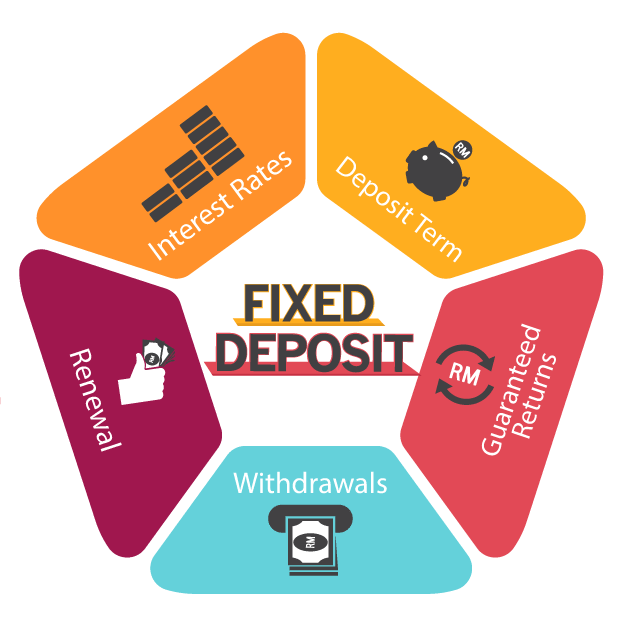
| In a Fixed Deposit, you put a lump sum in your bank for a fixed tenure at an agreed rate of interest. At the end of the tenure, you receive the amount you have invested plus compound interest. FDs are also called term deposits. |
Types of Fixed Deposits
- Normal Fixed Deposits
- Tax-Saving Fixed Deposits
- Senior Citizen Fixed Deposits
- NRI Fixed Deposits
- Cumulative/Non-Cumulative Fixed Deposits
- Flexi Fixed Deposits
Features of a Fixed Deposit Account
- Safer than other investment vehicles.
- Lets you earn interest over a fixed period of time.
- Flexible tenures of up to 10 years.
- No cap on the maximum deposit.
- Additional rates for senior citizens.
Senior Citizen Fixed Deposits
Fixed deposits for senior citizens have some features that differentiate them from fixed deposits for the general public, such as:
- The depositor should be 60 years and above at the time of opening the fixed deposit account
- Depending on the bank, interest rates are higher by 0.25% to 0.50%
- The tenure is between 7 days and 10 days
- Loan against FD can be availed
- Penalties for premature withdrawal are the same as for the general public
Eligibility Criteria for FD investment
The following entities are eligible to open an FD account in India:
- Indian resident
- NRI
- Minors
- Senior citizens
- Companies
- Partnership firms
- Individuals or joint investors
- Societies or clubs
- Sole proprietorship
Documents Required for opening an FD account
The documents required for opening an FD account are as given below:
- Proof of identity: Voter ID, PAN card, Aadhaar card, driving license, photo ration card, senior citizen ID card, etc.
- Proof of address: Utility bills, bank statement with cheque, Post-office issued identification card or certificate, etc.
How to open a Fixed Deposit
You can open an FD in two ways: online and offline.
Online: To open an FD account online, it would be easiest to do so with the bank where you already have an account. All you have to do is use the net banking facility, fill up the online form for opening an FD, and submit it. In such cases, KYC will not be required as your bank will already have the details. You can transfer the funds through your account using the internet banking facility.
Offline: Visit the nearest branch of your bank and fill up the application form for opening an FD account. Submit it to the concerned official with the required documents. Deposit the required amount and you will receive the FD receipt.
Factors that Affect FD Interest Rates
There are many factors that affect FD interest rates, some of which are given below:
- Deposit Tenure: The lower the tenure, the lower will be the interest rate and the higher or medium range the tenure, the higher the interest rate will be.
- Deposit Amount: Higher deposit amounts will fetch you higher interest rates, especially bulk deposits exceeding Rs.1 crore.
- Depositor type: Senior citizens typically get 0.25% to 0.50% additional interest rate on fixed deposits.
Fixed Deposit Interest Rate Calculator
The interest you can earn on your deposited amount depends on multiple factors, including the amount invested, tenure, rate of interest, interest computation frequency, and taxation. You can calculate the returns on your investment by using an FD calculator. The entire process of calculating the amount is easy and hassle-free. All you need to do is enter the deposit term, choose the type of FD (reinvestment, quarterly, or monthly payment), the investment amount, the date of account opening, and the interest rate.
Fixed Deposit Interest and Income Tax
- The income you earn on your FD is termed as Income from Other Source and it is fully taxable.
- Banks will not deduct TDS, if your interest income from fixed deposits is less than Rs.40,000 in a year.
- You need to submit Form 15G and Form 15H to the bank at the beginning of the financial year. Banks will not deduct TDS following the form submission.
CRISIL & ICRA Rating List for Corporate Fixed Deposits
It is beneficial to understand the credit ratings of corporate fixed deposits before you open an account. These ratings are a testament to the consistency, stability, and credibility of the companies that offer these FDs.
